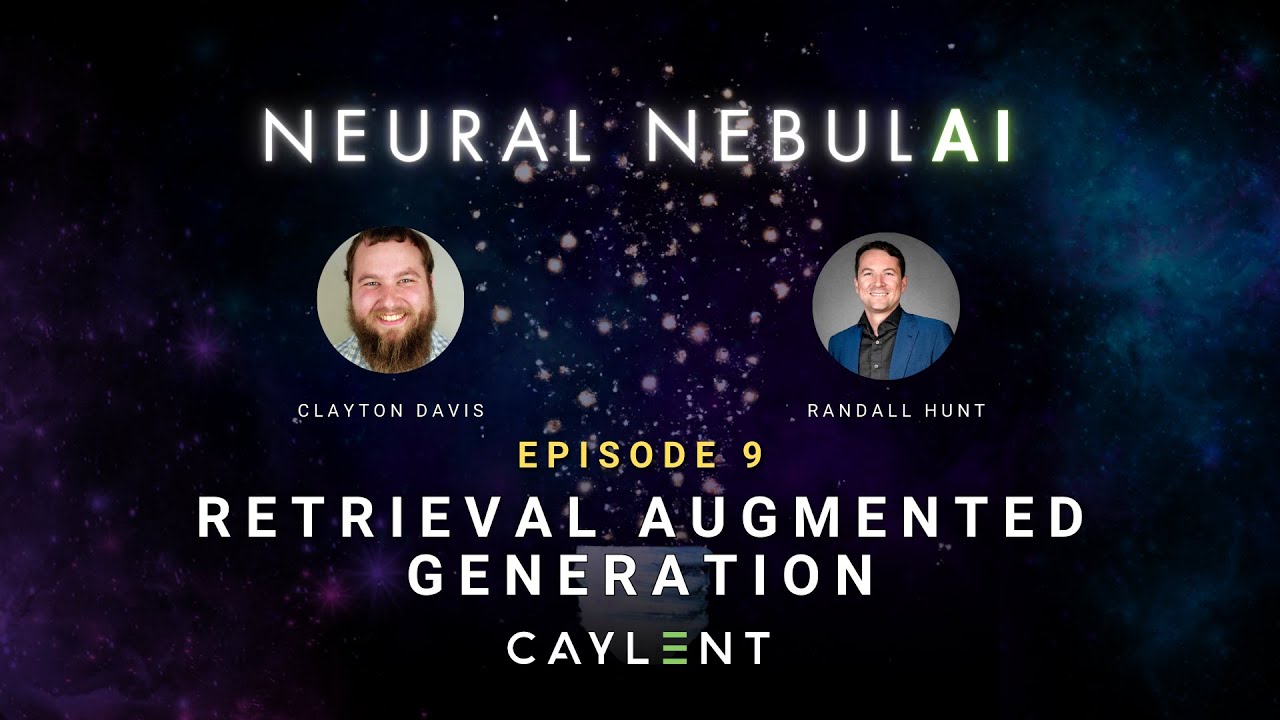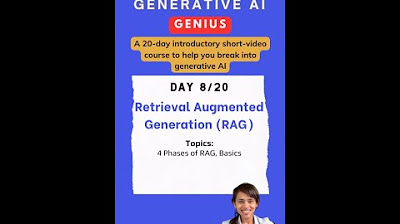RAG for long context LLMs
Summary
TLDRThe talk explores the evolving role of Retrieval-Augmented Generation (RAG) in the context of increasing context window sizes in language models. It discusses the phenomenon of 'context stuffing' and its limitations, particularly in retrieving and reasoning over multiple facts within a large context. The speaker presents experiments and analyses that highlight the challenges of retrieving information from the start of the context and suggests that RAG will continue to evolve, potentially moving towards document-centric approaches and incorporating more sophisticated reasoning mechanisms.
Takeaways
- 📈 Context windows for language models (LMs) are increasing, with some proprietary models surpassing the 2 trillion token regime.
- 🧠 The rise of larger context windows has sparked a debate on the relevance of retrieval-augmented generation (RAG) systems, questioning if they are still necessary.
- 🔍 RAG involves reasoning and retrieval over chunks of information, typically documents, to ground responses to questions.
- 📊 Experiments show that as the context window grows, the ability to retrieve and reason about information (needles) decreases, especially for information at the start of the context.
- 🤔 The phenomenon of decreased retrieval performance with larger context windows may be due to a recency bias, where the model favors recent tokens over older ones.
- 🚫 There are concerns about the reliability of long context LMs for retrieval tasks, as they may not guarantee the quality of information retrieval.
- 💡 The future of RAG may involve less focus on precise chunking and more on document-centric approaches, using full documents or summaries for retrieval.
- 🔗 New indexing methods like multi-representation indexing and hierarchical indexing with Raptor provide interesting alternatives for document-centric RAG systems.
- ♻️ Iterative RAG systems, which include reasoning on top of retrieval and generation, are becoming more relevant as they provide a more cyclic and self-correcting approach.
- 🔍 Techniques like question rewriting and web searches can be used to handle questions outside the scope of the retrieval index, offering a fallback for RAG systems.
- 🌐 The evolution of RAG systems is expected to continue, incorporating long-context embeddings and cyclic flows for improved performance and adaptability.
Q & A
What is the main topic of Lance's talk at the San Francisco meetups?
-The main topic of Lance's talk is whether the Retrieve-And-Generate (RAG) approach is becoming obsolete due to the increasing context window sizes of large language models (LLMs).
How has the context window size for LLMs changed recently?
-The context window size for LLMs has been increasing, with state-of-the-art models now able to handle hundreds to thousands of pages of text, as opposed to just dozens of pages a year ago.
What is the significance of the 'multi-needle' test conducted by Lance and Greg Cameron?
-The 'multi-needle' test is designed to pressure test the ability of LLMs to retrieve and reason about multiple facts from a larger context window, challenging the idea that LLMs can effectively replace RAG systems.
What did the analysis of GPD-4 with different numbers of needles placed in a 120,000 token context window reveal?
-The analysis revealed that the performance or the percentage of needles retrieved drops with respect to the number of needles, and it also gets worse if the model is asked to reason on those needles.
What is the 'recency bias' mentioned in the talk and how does it affect retrieval?
-The 'recency bias' refers to the tendency of models to focus on recent tokens, which makes retrieval of information from the beginning of the context window more difficult compared to information near the end.
What are the three main observations from the analysis of the 'multi-needle' test?
-The three main observations are: 1) Reasoning is harder than retrieval, 2) More needles make the task more difficult, and 3) Needles towards the start of the context are harder to retrieve than those towards the end.
What is the 'document-centric RAG' approach mentioned in the talk?
-The 'document-centric RAG' approach involves operating on the context of full documents rather than focusing on precise retrieval of document chunks. It uses methods like multi-representation indexing and hierarchical indexing to retrieve the right document for the LLM to generate a response.
How does the 'Raptor' paper from Stanford propose to handle questions that require information integration across many documents?
-The 'Raptor' paper proposes a method where documents are embedded, clustered, and summarized recursively until a single high-level summary for the entire corpus of documents is produced. This summary is used in retrieval for questions that draw information across numerous documents.
What is the 'self-RAG' paper and how does it change the RAG paradigm?
-The 'self-RAG' paper introduces a cyclic flow to the RAG paradigm, where the system grades the relevance of documents, rewrites the question if necessary, and iterates through retrieval and generation stages to improve accuracy and address errors.
How does the 'corrective RAG' approach handle questions that are outside the scope of the retriever's index?
-The 'corrective RAG' approach grades the documents and if they are not relevant, it performs a web search and returns the search results to the LM for final generation, providing a fallback mechanism for out-of-domain questions.
What are some key takeaways from Lance's talk regarding the future of RAG systems?
-Key takeaways include the continued relevance of routing and query analysis, the potential shift towards working with full documents, the use of innovative indexing methods like multi-representation and hierarchical indexing, and the integration of reasoning in the retrieval and generation stages to create more robust and cyclic RAG systems.
Outlines

Cette section est réservée aux utilisateurs payants. Améliorez votre compte pour accéder à cette section.
Améliorer maintenantMindmap

Cette section est réservée aux utilisateurs payants. Améliorez votre compte pour accéder à cette section.
Améliorer maintenantKeywords

Cette section est réservée aux utilisateurs payants. Améliorez votre compte pour accéder à cette section.
Améliorer maintenantHighlights

Cette section est réservée aux utilisateurs payants. Améliorez votre compte pour accéder à cette section.
Améliorer maintenantTranscripts

Cette section est réservée aux utilisateurs payants. Améliorez votre compte pour accéder à cette section.
Améliorer maintenantVoir Plus de Vidéos Connexes

Retrieval Augmented Generation - Neural NebulAI Episode 9

Llama 3.1 8B vs Mistral 7B in RAG

RAG vs. CAG: Solving Knowledge Gaps in AI Models

Introduction to Generative AI (Day 7/20) #largelanguagemodels #genai

Beyond the Hype: A Realistic Look at Large Language Models • Jodie Burchell • GOTO 2024

The Rise and Fall of the Vector DB category: Jo Kristian Bergum (ex-Chief Scientist, Vespa)
5.0 / 5 (0 votes)
